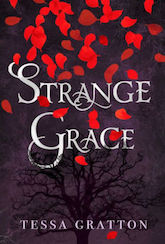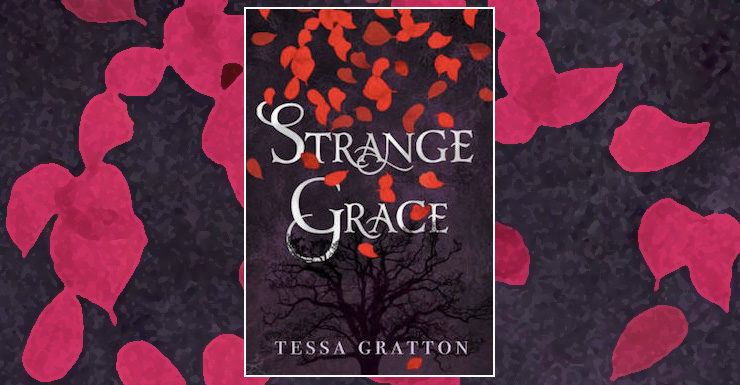Strange Grace is a standalone young adult novel from Tessa Gratton (also author of recently-released The Queens of Innis Lear) set in a town that knows no lasting hardship due to a pact with the devil. Illnesses pass in a night; wounds heal without infection; babies are born healthy with safe mothers; crops thrive under perfectly timed rains. However, the pact is upheld by the sacrifice of a young man every seven years to run the devil’s forest and see if he comes out victorious. The sacrifice of one allows all to live peacefully. None are forced—the trial is an honor.
Mairwen Grace is the only daughter of the town’s bloodline of witches, linked to the forest as her ancestors were before her, all the way back to the woman who made the original bargain. The witches form the liminal border between forest and town, life and death. However, when the bargain falls awry only three years after the last sacrifice, Mairwen and her closest companions, Arthur and Rhun, have a duty to determine the cause—whether they agree with the true nature of the bargain or not.
Strange Grace is a romance threaded through with mythos that achieves a satisfactory balance between pleasure and commentary, aware of genre conventions and in conversation with them. It knows the kind of book it is and delivers on those expectations. However, it also subverts several of the tropes one might expect from the start. For example, the potential “love triangle” is queer, polyamorous unit with its own rather different struggles regarding gender, jealousy, and the social order. The seven-year sacrifice is engaged with not as an obvious detriment but as a consensual and painful price paid for a worthwhile outcome, a much more complex approach than I generally see in stories of this sort.
While the plot runs along the exact path one might expect—the foreshadowing is not subtle—the functional plot is also not the purpose of the novel. Rather, the conceptual framework built around ideas of sacrifice, magic, and liminal spaces requires a plot to move but character development to live. The set pieces are basic enough, after all: a family of witches, a tradition of sacrificing the best boys to keep a bargain and offer prosperity, teenagers who don’t quite fit the mold and change tradition in the process. What Gratton does with them, her awareness of those as set pieces that are familiar, allows her to create a variant with its own arguments—which is the core strength of the novel.
As I said, it’s a romance first and foremost, in the broadly sweeping usage of the term. The relationships the characters have to each other, their home, the magic that keeps their home safe, and their ethical understanding of the world are what drives Strange Grace. Mairwen is close friends with a young woman her age, Haf; her mother is partners with another woman of the village; Rhun is the golden-boy leader of the town who soothes ill will and gives constantly of himself; Arthur in a rejection of his being forced into maleness reacts with violence and self-protection against all attempts at intimacy yet still forms a push-and-pull love with both Mair and Rhun.
Queerness is constant background but still remarkable, a fine balance that both soothed and pricked at me. Rhun has reason to be concerned at his affection for both Arthur and Mairwen. Arthur has double that to reject his own feelings for Rhun, though he’s still an inextricable part of his life. Mair has always been the strange one, making her own way, and she’s the first point of view character to give us the sense that if her boys could just get themselves together, she’d be ready to have them both as they have each other. The ties that bind the three of them lead them to the forest together to unmake and recreate a bargain of their own, eager to preserve a more ethical sacrifice for their beloved town.
That is one of the better parts of this book, as well: plenty of young adult fiction is about sacrificing young lives for the greater good, but it’s almost always presented as a black and white, good and evil situation where sacrifice is obviously flawed. However, Gratton digs in deeper and allows her story to explore the real costs and benefits of a consensual sacrifice that has hardline, actual, proven benefits for the greater populace. The boys are eager for the forest; they’re eager to support their loved ones and neighbors. The moral failing, as we discover, is that the myth of the bargain isn’t fully honest—and it should be. The actual cost should be made clear so it can be paid consensually and with eyes open.
Buy the Book


Strange Grace
Complex ethics are a pleasant surprise, especially as Gratton does not give up the idea of sacrifice by the end. It just changes shape and the burden is shared more equally, more honestly, with a willing embrace of the trade of life for death for life. It’s an ideal of communal shared responsibility, something I appreciate seeing in our current climate. The role legend and story plays—honest and dishonest alike—also points to the power of fiction, the power of a tale, to manipulate and unite, for better or worse. One small but indicative detail is the moment when Mairwen understands that gender has nothing to do with the ideal candidate for the sacrifice, except the picture that “girl witch, boy saint” painted was the easiest to sell in a story for generations.
Which brings us, in brief, to the last thing I’d like to note: the imagery and cadence of the text. Gratton plays with poetic, lyrical prose and functional description alike. Her scenes of passion are physical without tripping over the line into full-on erotic and also without denying her young adults the burn of sensuality. The devil’s forest is a verdant horror. Whether this is true or not, I had a personal question of how much the imagery of Hannibal might have played in with the antlers, the rot, the flowers—there’s a certain body horror that echoed and echoed to me scenes from the show, and the timing would be right, (but I suppose we’ll never know).
Strange Grace is not a complex novel—it is exactly what one would expect!—but the points it does strike are almost more engaging to me as a result. It’s a pleasure-read, a story that focuses on a trio of young people figuring out how to love each other best and rewrite their world with a sense of ethical responsibility. There’s risk and sacrifice, but also happiness. The enjoyment for me here is in seeing a straightforward fantastical romance also deal with queerness, gender, relationship negotiation, and social responsibilities. It’s a good example of the evolution of the field to be more inclusive and offer the same access to feel-good stories for a broader audience, and for that, I appreciated the experience of reading it.
Strange Grace is available from Margaret K. McElderry Books.
Lee Mandelo is a writer, critic, and editor whose primary fields of interest are speculative fiction and queer literature, especially when the two coincide. They have two books out, Beyond Binary: Genderqueer and Sexually Fluid Speculative Fiction and We Wuz Pushed: On Joanna Russ and Radical Truth-telling, and in the past have edited for publications like Strange Horizons Magazine. Other work has been featured in magazines such as Stone Telling, Clarkesworld, Apex, and Ideomancer.










